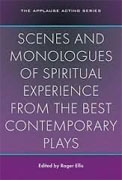Scenes and Monologues of Spiritual Experience
Roger Ellis
book reviews:
· general fiction
· chick lit/romance
· sci-fi/fantasy
· graphic novels
· nonfiction
· audio books
· author interviews
· children's books @
curledupkids.com
· DVD reviews @
curledupdvd.com
newsletter
win books
buy online
links
home
for authors
& publishers
for reviewers

 |
Scenes and Monologues of Spiritual Experience from the Best Contemporary Plays (Applause Acting Series) Roger Ellis Applause Books Paperback 312 pages October 2013 |
|
Excerpting is a difficult vocation. Not only must the excerpter know the many writings of his subject(s); he must be vigilant against any kind of personal bias which might make him pick and choose in a dishonest, non-representative or inappropriate way. Excerpting such topics as religion or politics can make the job even more difficult.
All that said, the collection is an excellent one, consisting of works which show playwrights from Judaism, Christianity, Islam, Hinduism. The editor's bias reveals itself early in the introduction when he describes the contemporary age as a “secular age.” Although the collection deftly shows traditional religion, culture intermixed with religion, and modern challenges, the phrase itself shows how mired the excerpter is. For those who are not in the Western white male middle-class culture, this might not be a secular age. The introduction is written for and by one who believes that those in traditional religion are at war—literal and symbolic—over doctrinal and religious issues. In many areas, Ellis writes seemingly from ignorance. For instance, at one point he writes: “It may surprise some readers to consider that so many contemporary plays deal with aspects of faith.” Or he pats himself on the back by saying “It is noteworthy that before now, no anthology has gathered this kind of dramatic material into a single collection.” The inane and profoundly smug idea that those in this age are more enlightened or less bounded in their spiritual perspectives than those in previous ages is evident throughout and shows that Roger Ellis may be knowledgeable about plays but he is not so knowledgeable about the history of religion. The book contains an introduction (which reads like a manifesto of current spirituality, an apology for choosing his friends—and their contact info in case the reader wishes to hire them—and a snide potshot at believers in traditional spirituality) and then is divided into ccenes for a man and a woman, scenes for two women, scenes for two men, monologues for women, and monologues for men. The scenes display a range of emotions for all actors involved, and the monologues have movement and depth to them. The plays achieve their purpose, and while they might achieve their purpose standing alone, by the end of the book, the reader who affirms traditional religion will feel slightly bombarded with propaganda while the reader who honors a more “contemporary” so-called secular spirituality will feel closer to something numinous and divine. This book is recommended for all readers: the non-traditionalists who will delight to have a book which shows what they will consider their innovative spirituality, and the traditionalists who (contrary to what Mr Ellis might think) have wisdom, spirituality, and a deep core of spiritual knowledge to contain all that Mr Ellis seems to consider so terribly new and hip. Originally published on Curled Up With A Good Book at www.curledup.com. © Carole McDonnell, 2014 |
|
|
|
 Click here to learn more about this month's sponsor! |
|
| fiction · sf/f · comic books · nonfiction · audio newsletter · free book contest · buy books online review index · links · · authors & publishers reviewers |
|
| site by ELBO Computing Resources, Inc. | |
 In
In